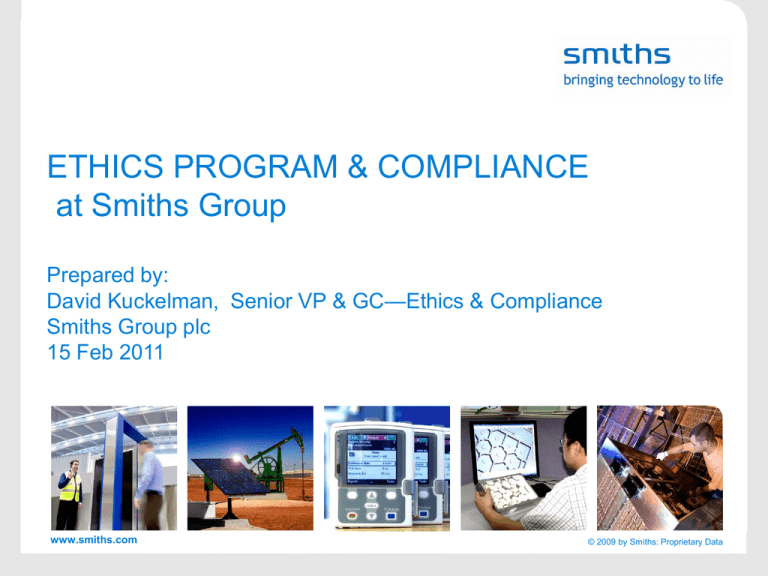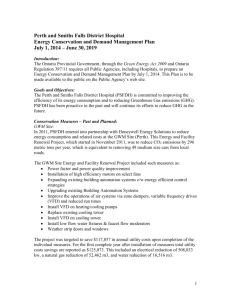Ethics & Compliance Program - Potomac Chapter of the National
advertisement

ETHICS PROGRAM & COMPLIANCE at Smiths Group Prepared by: David Kuckelman, Senior VP & GC—Ethics & Compliance Smiths Group plc 15 Feb 2011 www.smiths.com Code/Date © 2009 by Smiths: Proprietary Data © 2009 by Smiths: Proprietary Data TONIGHT - INTERACTIVE DIALOGUE… or else • • • • • • • • • • • • • • • • • • • • Reason or Rule - Why Have An Ethics or Compliance Program? _______________________________________________ _______________________________________________ _______________________________________________ _______________________________________________ Structure - What Does An Effective Compliance Program Look Like? _______________________________________________ _______________________________________________ _______________________________________________ _______________________________________________ Implementing - How Do You Talk the Talk and Walk the Walk _______________________________________________ _______________________________________________ _______________________________________________ _______________________________________________ The Home Run - Winning the Minds and Hearts of Employees _______________________________________________ _______________________________________________ _______________________________________________ _______________________________________________ Code/Date © 2009 by Smiths: Proprietary Data SHORT COURSE ON ETHICS & COMPLIANCE • Laying the Scene for Ethics & Compliance • Ethics Programme for Smiths Group • Elements of “Effective Compliance Program” • To train or not to train? • Taking culture of your company into account • Selection of materials and format • Determining level of detail and scope • Selecting an audience • Should you swing for the fences? • Measuring success Code/Date © 2009 by Smiths: Proprietary Data WHAT IS DRIVING SMITHS TO HAVE AN ETHICS PROGRAM? • It is NOT the Truth In Negotiations Act, but… • It is NOT the False Statements Act, but… • It is NOT the Civil False Claims Act Qui Tam provisions, but… • It is NOT the False Claims Act, but… • It is NOT the Federal Sentencing Guidelines, but… • It is NOT FAR 3.10 or FAR 52.203-13, but… Code/Date © 2009 by Smiths: Proprietary Data FAR 3.10 and FAR 52.203-13 Contractor Code of Business Ethics & Conduct • Policy • Government contractors must conduct themselves with the highest degree of integrity and honesty. • Contractors should have a written code of business ethics and conduct…and an employee business ethics and compliance training program • Contractors also should have an internal control system that— 1. Are suitable to the size of the company and extent of its involvement in Government contracting; 2. Facilitate timely discovery and disclosure of improper conduct in connection with Government contracts; and 3. Ensure corrective measures are promptly instituted and carried out. • Targeted activities of FAR coverage are “fraud, conflict of interest, bribery, or gratuity violations” or “a violation of the civil False Claims Act…” Code/Date © 2009 by Smiths: Proprietary Data FEDERAL SENTENCING GUIDELINES Effective Compliance Programs • DOJ - “Principles of Federal Prosecution of Business Organization” • An effective compliance program is considered useful in persuading law enforcement authorities to forgo enforcement proceedings • Sentencing credit offers significantly reduced penalties for companies that had an effective compliance program at the time the offense was committed • SEC - “Seabord Report” • Would consider taking no or reduced action against companies that self-police, self-report, remediate, and cooperate with the SEC Code/Date © 2009 by Smiths: Proprietary Data UK BRIBERY ACT • Royal Assent on 8 April 2010 • Expected to come into force in stages between June and October 2010 • Potentially heralds new era of enforcement activity (and not just for UK companies) • Compliance with FCPA may not be enough • General Offences of Bribery • Active offence of bribing another person • Passive offence of receiving a bribe • Separate offence of bribing a foreign public official • Corporate Offence • Negligently failing to prevent bribery • Definition of “Adequate Procedures” as defense TBD Code/Date © 2009 by Smiths: Proprietary Data RULE OR REASON IS THERE A REASON FOR THE RULE, OR ARE WE DOING THIS TO “TICK THE BOX”? 1. Companies with a strong sense of ethics are respected by their peers and competitors. 2. Companies with a strong sense of ethics are valued by their customers. 3. Companies with a strong sense of ethics tend to recruit a more qualified and stable workforce. 4. Ethical companies are more profitable and prosperous. 5. Employees of ethical companies are less likely to become whistleblowers. 6. Ethical companies are less likely to be investigated by government regulators. 7. Ethical companies are less likely to be prosecuted for crimes. 8. Ethical companies tend to spend less on external counsel and consultants. 9. Senior managers of ethical companies are less likely to go to jail. Code/Date © 2009 by Smiths: Proprietary Data “12 Step Program” for Effective Compliance 1. 2. 3. 4. 5. 6. 7. 8. 9. 10. 11. 12. Code and Policies Programme leadership at “senior” or “corporate” level Access and regular reports to Audit Committee of Board Management awareness, unqualified acceptance and leadership Training on Ethics and compliance obligations at appropriate levels Internal controls to prevent or detect inappropriate behaviour Monitoring and auditing to ensure compliance Reporting mechanisms (e.g. Helpline or Hotline) Guarantees of non-retaliation for whistleblowers, option of anonymity for those who desire it Rapid and thorough investigation of allegations Timely and appropriate responses to stop misconduct and discipline of violators Positive recognition of ethical behaviour Code/Date © 2009 by Smiths: Proprietary Data ROLES & RESPONSIBILITIES WITHIN SMITHS • Compliance with the Code is the responsibility of every employee, and that includes all levels of management • The Audit Committee of the Smiths Boards oversees the Smiths Ethics Programme • The Code Compliance Council sets the priorities for the Ethics Programme • Each of the “12 Steps” for an Effective Compliance Program has a “champion” • The Code is nothing without a serious and clear “Tone from the Top” • Day-to-day responsibility has been assigned to the Senior VP for Ethics & Compliance • Most activity remains within the Functions at the divisional level (e.g. HR and Legal) Code/Date © 2009 by Smiths: Proprietary Data Code of Business Ethics and Smiths Policies Code/Date © 2009 by Smiths: Proprietary Data BUSINESS UNIT POLICIES & PROCEDURES/ LOCAL GUIDANCE AND CONTROLS DIVISIONAL POLICIES e.g. JOHN CRANE POLICIES SMITHS GROUP POLICIES THE BUSINESS ETHICS PROGRAMME SMITHS GROUP CODE OF BUSINESS ETHICS Code/Date © 2009 by Smiths: Proprietary Data TO TRAIN OR NOT TO TRAIN? (If there is a risk…) 1. 2. 3. 4. 5. 6. 7. 8. 9. 10. 11. 12. Code and Policies Programme leadership at “senior” or “corporate” level Access and regular reports to Audit Committee of Board Management awareness, unqualified acceptance and leadership Training on Ethics and compliance obligations at appropriate levels Internal controls to prevent or detect inappropriate behaviour Monitoring and auditing to ensure compliance Reporting mechanisms (e.g. Helpline or Hotline) Guarantees of non-retaliation for whistleblowers, option of anonymity for those who desire it Rapid and thorough investigation of allegations Timely and appropriate responses to stop misconduct and discipline of violators Positive recognition of ethical behaviour Code/Date © 2009 by Smiths: Proprietary Data ETHICS versus COMPLIANCE Smiths’ Code of Business Ethics consists of 12 “Principles”/”principles” • The Code is a standard of conduct • The Code is “principle-based” and not “rule-based” • Adherence to the principles of the Code may set a higher standard • Noncompliance with the Code may result in disciplinary action even though there is no violation of national law or regulation • Smiths expect all suppliers to maintain a comparable standard of conduct to that set out in the Smiths’ Code Compliance is a bit more broad a concept, but can include quite specific requirements • Compliance is an action or a process (e.g. training or auditing) • We must “comply” with the Code and all Policies • The Code requires compliance with Smiths’ and divisional policies • The Code requires compliance with national laws and regulations Code/Date © 2009 by Smiths: Proprietary Data TAKING INTO ACCOUNT TRADITION & CULTURE WE ARE WELL KNOWN AND RESPECTED IN OUR INDUSTRY Smiths is one of the most successful companies in its fields Smiths’ customers rate our products and services highly Smiths’ suppliers see our relationship with them as a “partnership” Smiths’ employees basically are happy and content WE DO THINGS THE RIGHT WAY ALWAYS Governments see Smiths as a “good corporate citizen” Smiths conducts its business in compliance with applicable laws Smiths is proud of its “culture of compliance” around the world Smiths would refuse a sale if there was a hint of impropriety WE ARE SMITHS (but are all individual employees on board?) Code/Date © 2009 by Smiths: Proprietary Data SELECTION OF MATERIALS & FORMAT • SOME PRELIMINARY CONSIDERATIONS • Why are you conducting training? • How many people are you trying to reach? • Where are they located? • What are the native languages? • What is the existing level of knowledge of target audience • What is your level of knowledge of subject matter? • What is your budget for training? • ONLINE OR FACE-TO-FACE? • IN-HOUSE TRAINERS OR OUTSOURCED? Code/Date © 2009 by Smiths: Proprietary Data DETERMINING LEVEL OF DETAIL & SCOPE • TACTICAL DECISIONS • How much time do you have for this training? • Do you want a level of awareness or one of knowledge? • Are you “training the trainer” or training the actors? • What is the temperature and appetite of Management? • How many shots will you get? • How will you know if you won the “battle for hearts and minds”? • STRATEGIC DECISIONS • What is the level of risk you face? • What are the program objectives? • How will you know if you won the war? Code/Date © 2009 by Smiths: Proprietary Data SELECTING (AND KNOWING) YOUR AUDIENCE • Start with Management • Top down is critical for tone from top • Get the boss to instruct his or her team leaders/managers (with your help) • Go to the lowest level of authority and get the message across • Know your Risk • If you don’t know your path to market, stay home • National laws differ, so consider a principle-based approach • Know where the rubber meets the road and drive it home • Swing for the Fences or Go for the Throat • Know the people as well as the subject matter • Make it interesting, but not too much humor • Keep it simple, but…get the message across clearly • Follow up Code/Date © 2009 by Smiths: Proprietary Data MEASURING SUCCESS • INVOLVE MANAGEMENT IN SELECTING METRICS • Get buy-in to the measures of success from business leaders and functional leaders • Also get input on how to measure • MEASURE HONESTLY & CRITICALLY • Use assessments at the time of training • Get feedback from higher level of management • Be prepared to accept criticism as well as credit • ACT ON THE OUTCOME • PLAN FOR AN ENCORE • It may not take the first time • If it was important then, it still is important • Learning requires reinforcement • YOU WILL SUCCEED Code/Date © 2009 by Smiths: Proprietary Data ARE YOU BEING SERVED … (by your Ethics program)? www.smiths.com Code/Date © 2009 by Smiths: Proprietary Data © 2009 by Smiths: Proprietary Data










